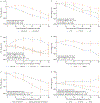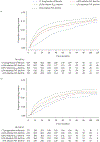Lung function trajectory in progressive fibrosing interstitial lung disease
- PMID: 34737223
- PMCID: PMC10039317
- DOI: 10.1183/13993003.01396-2021
Lung function trajectory in progressive fibrosing interstitial lung disease
Abstract
Background: Proposed criteria for progressive fibrosing interstitial lung disease (PF-ILD) have been linked to increased mortality risk, but lung function trajectory after satisfying individual criteria remains unknown. Because survival is rarely employed as the primary end-point in therapeutic trials, identifying PF-ILD criteria that best predict subsequent change in forced vital capacity (FVC) could improve clinical trial design.
Methods: A retrospective, multicentre longitudinal cohort analysis was performed in consecutive patients with fibrotic connective tissue disease-associated ILD (CTD-ILD), chronic hypersensitivity pneumonitis and idiopathic interstitial pneumonia at three US centres (test cohort) and one UK centre (validation cohort). 1-year change in FVC after satisfying proposed PF-ILD criteria was estimated using joint modelling. Subgroup analyses were performed to determine whether results varied across key subgroups.
Results: 1227 patients were included, with CTD-ILD predominating. Six out of nine PF-ILD criteria were associated with differential 1-year change in FVC, with radiological progression of fibrosis, alone and in combination with other features, associated with the largest subsequent decline in FVC. Findings varied significantly by ILD subtype, with CTD-ILD demonstrating little change in FVC after satisfying most PF-ILD criteria, while other ILDs showed significantly larger changes. Findings did not vary after stratification by radiological pattern or exposure to immunosuppressant therapy. Near-term change in FVC after satisfying proposed PF-ILD criteria was heterogeneous depending on the criterion assessed and was strongly influenced by ILD subtype.
Conclusions: These findings may inform future clinical trial design and suggest ILD subtype should be taken into consideration when applying PF-ILD criteria.
Copyright ©The authors 2022. For reproduction rights and permissions contact permissions@ersnet.org.
Conflict of interest statement
Conflict of interest: J.M. Oldham reports grants from the National Institutes of Health, during the conduct of the study; personal fees from Boehringer Ingelheim, Genentech, Lupin, Gatehouse Bio and AmMax Bio, outside the submitted work. Conflict of interest: C.T. Lee has nothing to disclose. Conflict of interest: Z. Wu has nothing to disclose. Conflict of interest: W.S. Bowman has nothing to disclose. Conflict of interest: J.V. Pugashetti has nothing to disclose. Conflict of interest: N. Dao has nothing to disclose. Conflict of interest: J. Tonkin has nothing to disclose. Conflict of interest: H. Seede has nothing to disclose. Conflict of interest: G. Echt has nothing to disclose. Conflict of interest: A. Adegunsoye reports grants from the National Institutes of Health, personal fees for lectures and consultancy from Boehringer Ingelheim, personal fees for consultancy from Genentech, outside the submitted work. Conflict of interest: F. Chua has nothing to disclose. Conflict of interest: T.M. Maher has, via his institution, received industry-academic funding from AstraZeneca and GlaxoSmithKline R&D, and has received consultancy or lecture fees from AstraZeneca, Bayer, Blade Therapeutics, Boehringer Ingelheim, Bristol-Myers Squibb, Galapagos, Galecto, GlaxoSmithKline R&D, IQVIA, Pliant, Respivant, Roche and Theravance. Conflict of interest: C.K. Garcia has received institutional funding for research from the National Institutes of Health, Dept of Defense and Boehringer Ingelheim, as well as prior compensation from Pliant Therapeutics Inc. for advisory board service. Conflict of interest: M.E. Strek reports grants, personal fees and non-financial support from Boehringer Ingelheim, grants from Novartis, outside the submitted work. Conflict of interest: C.A. Newton reports grants from the National Institutes of Health (NIH) National Heart, Lung, and Blood Institute (K23HL148498) and NIH National Centre for Advancing Translational Sciences (UL1TR001105), during the conduct of the study; personal fees for consultancy from Boehringer Ingelheim, outside the submitted work. Conflict of interest: P.L. Molyneaux, via his institution, received industry-academic funding from AstraZeneca, and has received speaker and consultancy fees from Boehringer Ingelheim and Hoffman-La Roche, outside the submitted work.
Figures



References
Publication types
MeSH terms
Grants and funding
LinkOut - more resources
Full Text Sources
Medical
